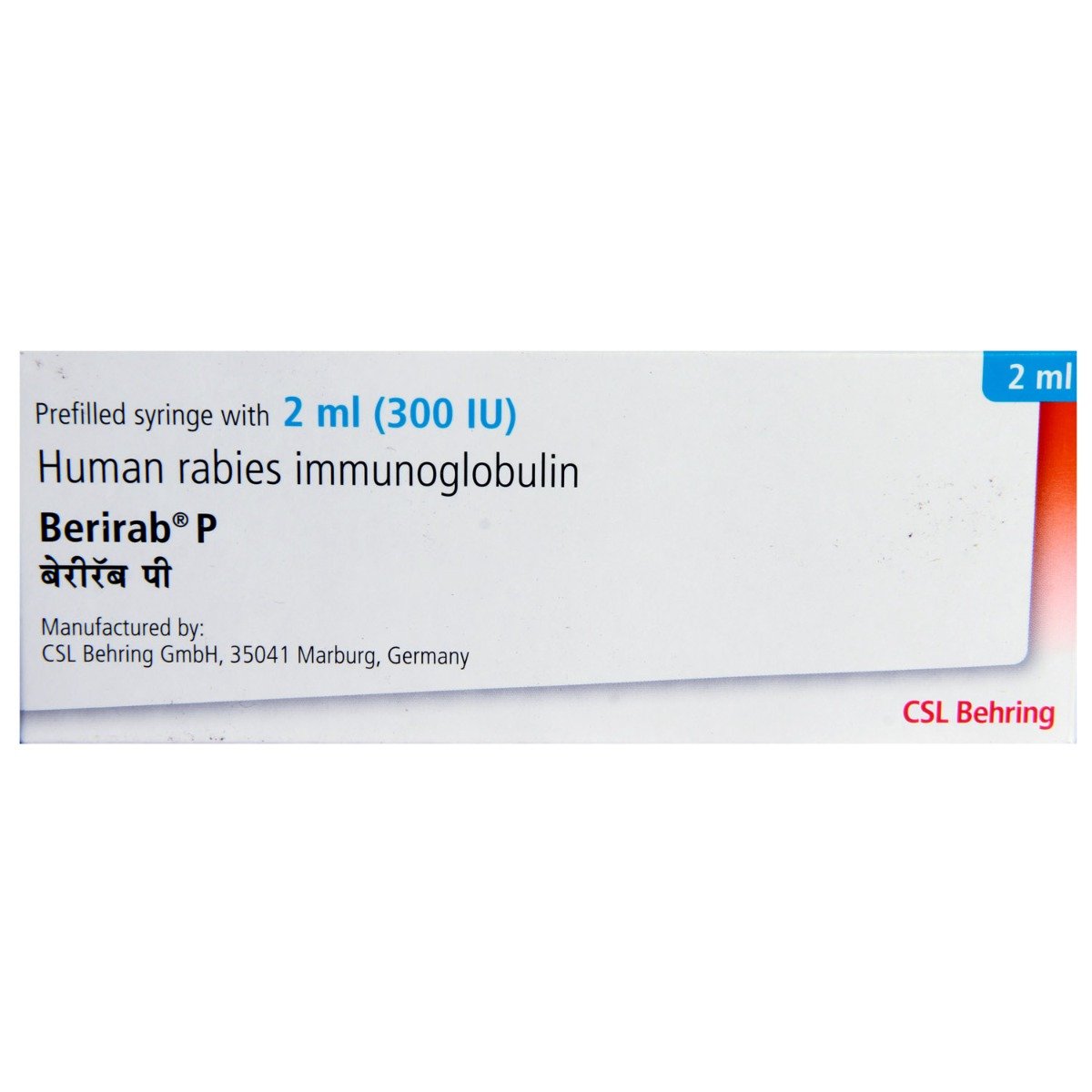Rabies Immunoglobulin
About Rabies Immunoglobulin
Rabies Immunoglobulin is an immunoglobulin that contains antibodies that act against rabies. Rabies is a viral disease that spread from dogs to humans through bites or scratches, usually via saliva. This medicine is given to bitten, scratched or had any injury from the suspected animal with rabies.
Rabies Immunoglobulin contains ‘immunoglobulins’, i.e. antibodies that act against rabies disease. It helps to prevent rabies disease post-exposure by neutralizing the rabies virus. It is usually not required in people who have been vaccinated against rabies disease.
Rabies Immunoglobulin is administered by a healthcare professional. The common side-effects of Rabies Immunoglobulin are temporary discomfort or hardened area at the injection site, chest pain, shortness of breath, dizziness, swelling of the face, mouth ulcers, chills, coating of the tongue and joint pains. Inform your doctor if any of these side effects persist or worsen. Seek medical injection immediately if you have any allergic reaction such as swelling of the face, shortness of breath, hives (urticaria), wheezing, or flushing (reddening of the face) after taking this injection. Also, inform your doctor even if you feel sick after taking this medicine.
Before taking Rabies Immunoglobulin, inform your doctor if you are suffering from any blood disorder, had any vaccinations recently, or have already had this product recently. Inform your doctor if you are pregnant or breastfeeding. Inform your doctor if you are taking any other prescription or non-prescription medicines.
Uses of Rabies Immunoglobulin
Medicinal Benefits
Rabies Immunoglobulin contains antibodies against the rabies virus. Antibodies are proteins that provide immunity by identifying and neutralizing foreign objects in the body. Rabies Immunoglobulin is given to prevent rabies disease. It should be given along with the first dose of the rabies vaccine or within 7 days of the vaccine administration. The injection is usually given at the wound site to neutralize the virus.
Directions for Use
Storage
Side Effects of Rabies Immunoglobulin
- Temporary discomfort or hardened area at the site of injection
- Chest pain
- Shortness of breath
- Dizziness
- Swelling of the face
- Mouth ulcers
- Chills
- Coating of the tongue
- Joint pains
- Slight fever
Drug Warnings
Inform your doctor if you already had Rabies Immunoglobulin recently as the previous injection may interfere with the rabies vaccine. And inform your doctor if you have recently taken this medicine as it may alter your blood test results.
Drug Interactions
Drug-drug interactions: Please tell your doctor if you are taking, or have recently taken, any other medicines, including those obtained without a prescription. This solution for injection must not be mixed with other medicinal products for injection.
Drug-food interactions: No interactions found.
Drug-disease interactions: Rabies Immunoglobulin should be used with caution in patients with the blood disorder.
Drug-Drug Interactions Checker List:
Safety Advice

Alcohol
cautionAlcohol consumption may interact with the action of Rabies Immunoglobulin.

Pregnancy
cautionRabies Immunoglobulin can be given to pregnant women if clinically needed.

Breast Feeding
cautionRabies Immunoglobulin can be given to breastfeeding mothers if clinically needed.

Driving
safe if prescribedRabies Immunoglobulin may not affect your ability to drive.

Liver
safe if prescribedRabies Immunoglobulin can be safely used in patients with liver diseases if prescribed.

Kidney
safe if prescribedRabies Immunoglobulin can be safely used in patients with kidney diseases if prescribed.

Children
safe if prescribedRabies Immunoglobulin can be given to children below 12 years if clinically needed.
Habit Forming
Diet & Lifestyle Advise
- Vaccinate your pets up-to-date.
- If you have been bitten or scratched by an animal, wash with soap and water immediately and consult a doctor.
Special Advise
Seek medical attention if you have been in contact with any wildlife animal, especially if you have been bitten or scratched to rule out rabies or any other zoonotic diseases (diseases transmitted from animals to humans). Rabies Immunoglobulin may give misleading results if you have a blood test. Inform your doctor if this is the case and tell your doctor as the previous injection may interfere with the vaccine.
Patients Concern
Disease/Condition Glossary
Rabies: Rabies is a viral disease caused by the ‘rabies virus. It can be prevented by vaccination. It is spread from animals with rabies to humans through bites or scratches, usually via saliva. This condition affects the brain, which can be sometimes life-threatening. The initial symptoms are flu-like, general weakness, fever, or headache. The disease may progress to anxiety, confusion, brain dysfunction, hallucinations, and abnormal behavior if left untreated.
FAQs
Rabies Immunoglobulin contains antibodies that act against the rabies virus. It identifies and neutralizes the virus and prevents rabies disease in people exposed to the rabies virus.
The common side-effects of Rabies Immunoglobulin are temporary discomfort or hardened area at the injection site, chest pain, shortness of breath, dizziness, swelling of the face, mouth ulcers, chills, coating of the tongue and joint pains. Inform your doctor if any of these side-effects persist or worsen.
Rabies Immunoglobulin contains immunoglobulins or antibodies that act against the rabies virus. It is given immediately after exposure to the rabies virus (bites, scratches, contamination with saliva on broken skin, and exposure to bats) along with the rabies vaccine or within 7 days after taking the vaccine. However, Rabies Immunoglobulin is not required if you have previously taken rabies vaccination.
A repeat dose of Rabies Immunoglobulin may be given if required. However, your doctor determines if you need a repeat dose.
Rabies Immunoglobulin provides rapid immune response towards the rabies virus as soon as it is injected and its action may last for approximately 21 days.




